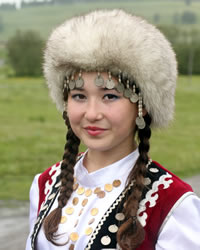There were several explorers and traders who had contact with the Bashkir, but in 922 an Arab ambassador wrote the first profile of this nomadic people group. Some were beekeepers, but most were pastoralists who raised horses, cattle and sheep. They were noted for being tough and warlike.
The Bashkirs have been dominated by more powerful peoples for centuries. By 1236, Ghenghis Khan and the Mongols incorporated their land. They had more independence after the fall of the Mongol Empire, but by the middle of the 1700s the Bashkir land was being gradually gobbled up by the Russian tzars. Ivan the Terrible and Catherine the Great were among their conquerors, and their land has been in some form of submission to Russia ever since. They sided with the communist Bolsheviks in the 1917 Revolution, so for a time the Russians gave them a degree of independence. Their homeland was the only one which voluntarily was associated with the newly formed USSR.
Though most Bashkirs live in their homeland that is now in southwestern Russia, others have fled to other countries like Belarus, Moldova, Ukraine, Kazakhstan, Turkmenistan, Tajikistan, Kyrgyzstan, Azerbaijan, and Armenia.
Though the Bashkirs were traditionally nomadic herdsmen, most are farmers today, though they still raise livestock. Today they grow wheat, oats, sunflowers, corn, cucumbers, tomatoes, and potatoes with modern equipment.
Much of the tribe's social significance has been lost. Today, the village itself is regarded as the key to their social structure. Some of the Bashkir groups have lost all memory of their tribal clan origin. The village is their community today. Nevertheless, they still express their sense of kinship and loyalty to kinsmen. About half of the Bashkirs live in cities, the other half live in rural areas. Bashkir marriage ceremonies usually take place in their homes. However, a mullah (Muslim leader) usually participates in the marriage agreement. Young newlyweds live with the husband's parents until they are ready to form their own family. Polygyny (the practice of having more than one wife at a time) is a thing of the past.
Bashkir cuisine is heavy on dairy products. Their traditional dish is bishbarmaq, with includes boiled meat and a type of noodle covered with herbs, onions, and cheese.
The Bashkirs love their folklore, which is usually about their early history. It includes aspects of worldly wisdom, morals and social aspirations. These are in the form of mythology, fairy tales and legends. They are especially fond of poetry.
Although the Bashkirs are not as zealous as other Muslims, any form of Islam is difficult to influence.
The Bashkirs began to convert to Sunni Islam in the 1100s, and there was wholesale conversion in the 1300s. In the eighteenth century, the Orthodox Church attempted to convert them to Christianity, but today, very few are Christians. Those who converted to Christianity are now organized into a tiny, separate minority known as the Nagaibaks. Although the Bashkirs are not as zealous as other Muslims, any form of Islam is difficult to influence. This stronghold can only be broken down through prayerful intercession.
The Bashkirs know very little about their own history. They are a people who lack security in who they are. They need to know that this security can only be found through Jesus Christ!
Pray for an abundant harvest this year for Bashkir farmers as a testimony of God's kindness and power.
Pray for Bashkir elders to open their communities to the transforming work of Jesus Christ.
Pray for a spiritual hunger that will lead Bashkir Muslims in Turkmenistan to the cross and the empty grave.
Pray for workers, filled with the fruit and the power of the Holy Spirit, to be thrust out into Bashkir communities.
Pray for an unstoppable movement to Christ among the Bashkirs in Turkmenistan.
Scripture Prayers for the Bashkir in Turkmenistan.
| Profile Source: Joshua Project |










